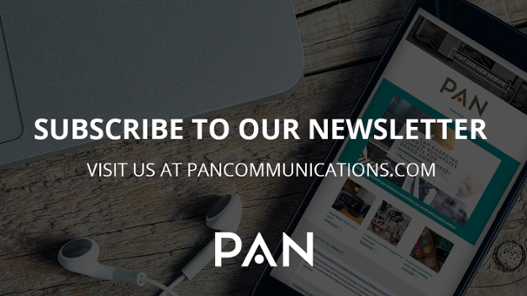Phil Carpenter, Executive Vice President at PAN Communications, sits down with one of PAN’s global partners, Lucy Turpin Communications (LTC). LTC is a technology-focused communications firm located in Munich, Germany. Phil speaks with the owner and founder of LTC, Lucy Turpin, alongside Thomas Hahnel, general manager and managing director of LTC. They discuss some of the major differences in B2B technology communications between U.S. and Germany, including: tech PR, media relations, integrated marketing, and the challenges that American companies face trying to make their way over to the German market.
Read the transcript below or listen to the podcast and enjoy the conversation!
Phil: What do you two see as the biggest differences in B2B tech PR between the United States and Germany?
 Lucy: Well, Phil, I think there are a lot of factors. But one that’s right at the top of my list anyways is that Germany has a more heterogeneous trade-media landscape. That means that we have more vertical publications and more diversity. We probably have 2,100 publications and counting. And maybe two-thirds of those are business and professional publications. Just a third would be consumer publications. And, of course, we have a lot of associations. Germans are very association-oriented and our multiplicators and our influencers. So that’s one factor. I think there are fewer opportunities for enterprise software tech stories in the business press in Germany. I mean there are reasons for that. We don’t have such a big software industry. Everyone knows SaaS, but the next few companies draw a blank. So that’s another reason.
Lucy: Well, Phil, I think there are a lot of factors. But one that’s right at the top of my list anyways is that Germany has a more heterogeneous trade-media landscape. That means that we have more vertical publications and more diversity. We probably have 2,100 publications and counting. And maybe two-thirds of those are business and professional publications. Just a third would be consumer publications. And, of course, we have a lot of associations. Germans are very association-oriented and our multiplicators and our influencers. So that’s one factor. I think there are fewer opportunities for enterprise software tech stories in the business press in Germany. I mean there are reasons for that. We don’t have such a big software industry. Everyone knows SaaS, but the next few companies draw a blank. So that’s another reason.
I think another difference is that we have relationships with journalists that go beyond phone and email. If I’m correct, in the States most of the agency work is done without even having met the journalist in person. Here, we still arrange person-to-person meetings between our clients and our journalists. And we make it a point to meet journalists at events and tradeshows and whatever else is going on. So, there’s that relationship factor that is, I think, pretty much privy to Germany. I’m not sure that other countries have that kind of relationship. Bloggers in Germany are not as influential as bloggers in the U.S. And I think that they’re going down also. I think there was a hype at one point. Many of the bloggers are journalists or editors. And maybe another big factor is that editors and their readers usually want more technical detail and in-depth articles in Germany.
 Thomas: Very important, just to stress again, is that we very often need technical expertise in the content that we provide to the influencers and to the publications that we are addressing. So, this is an important factor, I think.
Thomas: Very important, just to stress again, is that we very often need technical expertise in the content that we provide to the influencers and to the publications that we are addressing. So, this is an important factor, I think.
***
Phil: Now, some of our audience members may already be operating in European markets like the UK or France. And I’m wondering, how does tech PR differ in Germany versus in those other countries?
Thomas: Content is key everywhere, to a certain degree. So, it is about the content and it’s about selling this content. And I think the format might be different slightly, at least, in these geographies. Nevertheless, of course, especially talking about tech PR is that we have differences, for example, sometimes with regulations and there are some other market conditions which can affect the content. Sometimes the trends and topics might be a little bit different. For example, talking about the Internet of Things (IoT). In Germany, we have a strong focus by using the term on what you would call the Industrial Internet of Things (IIoT). So, there are some slight differences in terms of the topics and in terms of the trends. While, of course, the megatrends and the mega topics, as such, are quite similar. You see with our experiences that Germany, for example, is way more decentralized than other countries. In Germany, you find publications spread all over the country and you find companies spread all over the country. While in France and then in the UK, you have one capital city which is Paris or London, and everything is concentrated.
I think it’s quite similar in Italy and Spain. For example, Milan, Barcelona, Madrid, are the huge cities, and nearly everything is centered there. I mean, we are living in a digital age, so at first hand it might not play such a huge role, but in the detail activities sometimes it’s decisive. Talking about the logistics, talking about meeting people, talking about tradeshows, talking about road shows, and all these kinds of things. So, this affects our planning sometimes.
***
Phil: And given your interest in meeting with people face-to-face, does this decentralization make that harder? Do you have to travel more?
Thomas: Yes. Definitely. And despite the fact that Germany is a small country, we should not forget that going to Berlin from Munich takes a one-hour flight. You have tradeshows spread all over the country, and it just simply takes time to go there. And every company representative has to travel. The editors have to travel. Agency people have to travel. And sometimes it’s not only concentrated on one country. For example, talking about the relationship between Germany and Austria, there might be a relevant event just across the border. You have to keep in mind that not everything is around the corner.
***
Phil: Now, in the U.S., there’s a strong emphasis these days on integrated marketing and PR programs. Has Germany reached that same point?
Lucy: It’s funny [laughter]. So, when I was working in the semiconductor industry in the 1980s, it was all about integrated marketing communications. Seriously. Yeah? And then suddenly, the same term pops up again. But I think the meaning has evolved. Now we have tools that distribute the various aspects of a campaign, for example, like the touch of an enter key. We have ways of monitoring and evaluating that we didn’t have before. But the idea of integrated marketing communications has been around for a long time.
***
Phil: You think that’s similar from country to country?
Lucy: I think it has parallels in different industries and how one communicates in different industries, and I think that all agencies in the tech area speak the same marketing language and the buzzwords are the same, if you will. And so, I think every agency is onto integrated marketing at the moment. Or for the last few years and will be in the future also.
Thomas: I fully agree on what Lucy said. I just want to point out that due to our experience, it’s very different between the companies. So, for example, we as an agency, we have clients here who are fully integrated, who are sitting on super-sophisticated, automated marketing systems. And we contribute to these systems, while others are not, and everything in between. And the thing is, talking about integrated marketing, a lot of companies come to Germany, come to Europe with this idea in their mind. But then, you realize complexities start because perhaps there’s not enough staff on the ground. There’s perhaps no marketing people here, or just one guy responsible for all communication activities. We have, of course, still different languages which sometimes makes it difficult to feed automatic marketing systems because there are various languages. And so, the complexity is starting and sometimes it simply breaks up in the usual channel without integration, you know what I mean?
***
Phil: I do. I do. Well, how do you think the agency landscape differs in Germany in comparison to in the U.S.?
Lucy: I think there are more larger agencies in the U.S., they have more clients, and they have more employees. Even the multinational agencies that are represented in many geographies all over the world, but they – and obviously in the subsidiaries – there are fewer clients and fewer people. I think that’s a big difference in terms of agency landscapes.
Thomas: Due to my experience, when I worked with Hill & Knowlton, and I met my U.S. colleagues, I mean, we are talking the same language, we are using the same tools, we are using the same back words, we are talking about the same trends in which I too leverage the same kind of activities and approaches. So, I think due to Europe geography, Germany, and other European countries, the agencies in these countries are more internationally-minded because they have to be. I mentioned that earlier, talking about decentralization. This is true for all of Europe to a certain degree. And, of course, the borders are not here. The tradeshows, for example, are spread all over Europe, and clients sometimes are not based in every country. It’s just in the few, or in the largest markets. We have this international checkup very often. And, of course Europe in size is like the U.S. – we have a lot of international people working in the agencies, or in the countries. It’s not a surprise to meet someone from the UK working for a French company, and certainly in the Italian office, or something like that. And the international mindset might be more, in our minds, than our colleagues in the U.S.
***
Phil: I think that’s right. Now, what would you say would be your top two to three PR tips for American tech companies looking to enter the German markets?
Thomas: I think what we see again and again is that companies should really engage in sustainable communications. Sometimes we need companies that are simply interested, for example, in a product launch, or something like that, and due to our experience, this is not enough. There should be some patience. There should be time and effort involved. Build up a dialogue so that you are really respected as a local player, and not as an alien who is just jumping into the game, and then leaves within the next five minutes.
Lucy: If I can add to that comment, I think that the communication work that we do needs to get relevant in local terms. I can’t really underestimate that. Something you know that is relevant to the U.S. market may not be relevant to the German market. And you need that additional process where in communicating, you find that hook, a topic, or a scene that is popular or is part of the mindset of the local person, whether you’re doing PR in Germany, or any other country.
Thomas: This leads me to my next point, talking about language and talking about content. So, for example, a simple translation of a press release, or an article, or any kind of content. It’s not really an adaptation to the market. And even sometimes in business – what Lucy said – an adaptation is not even enough. You have to localize your content. So very often you need to add local aspects that are relevant for the German market, and this is not a joke. Sometimes we meet companies coming here with content translated by Google Translate. We even saw webpages, German language webpages, translated by Google, and so this is definitely the wrong way. You really should put some effort on local adaptation of content. I think companies coming to the market here should really have some kind of trusted partner. This is not because I want to sell our business, but this is true not only for communication, this is true for sales, this is true for regulations, this is true for legal aspects and all kinds of business aspects. Ask a local who is really deep in the market, and then you have a trusted source of information which gives you a good feeling for your activities abroad.
***
Phil: Now, what would you say would be the biggest PR mistake, apart from using Google Translate, that you see American companies making when they enter Germany?
Lucy: How much time do we have Phil?
Phil: Yeah, there are many, right? But the most egregious, perhaps.
Lucy: Okay. Like Thomas said, number one, this project-oriented thinking is not useful. You’ll need a 12-month plan, that includes a range of marcomm activities. The one-size fits all strategy is not good. You have one strategy in the States, but you have to break it down so that it makes sense in the French market, the UK market, the Dutch market etc. Corporate content that has no room for the region or the locals, is also considered a malpractice. If there is a real limit on the budget, then forget it. It’s a waste of time. It’s a waste of effort. It’s a waste of those dollars – seriously. Don’t come in and do a project for $2,000 or $5,000. Don’t come in in December and do something, and then maybe next August, the editors will have forgotten about you. So, don’t spend it. Don’t spend it on that.
A social media plan that has no clue about maintenance over time is something that’s a big mistake, and we see that time and time again. There’s no planning of themes for the future, not even like in a six-month timeframe or something like that. A newsflash with no news, is something we see a lot, and then we tell our clients this is not relevant here at all, and it’s difficult to manage those expectations of your clients. Releases also, and this is detailed, but releases with overused adjectives like world’s leading, and game-changing, and etc. What else? Unrealistic expectations for the bloggers. I guess you touched on that. Cancelling interviews or rather meetings with journalists, not good. Okay. That’s a short list, Phil.
Phil: Those are great. There could be many others, I’m sure, but that’s probably a couple of the biggest opportunities or problems for listeners – so thank you. And thank you guys for the time. These are great comments for people who will be new to the German market, and I appreciate the insights.
Lucy: Okay. Thank you very much for the opportunity. I look forward to meeting you in person in Boston the next time I’m there.
Thomas: Phil, thank you again. Just some famous last words. The cultural differences, the differences between how we develop our business models. So, what I want to say is very often, Lucy and I are talking about these things. I think I mentioned just lately I spoke to some students about this topic. I think you can find on our YouTube channel a video where Lucy and I are talking about this topic. So, this way, I just want to point out that this is really something that we try to leverage content-wise to a certain degree, and very often I’m kidding here, and I’m joking around and saying, “Hey, at the end of today, if I find time I will write to talk about that.” And I’m serious. At least I try to.
And I’m saying all of that because I see some academic content about intercultural communications, blah blah blah. You know what I’m talking about. But I do not see too much on a practical level about these topics. And I just wanted to flag this for you as a potential partner in this. I do not have a concrete idea. I do not have too much time, to be honest, because there are a lot of clients here that have to be served. But still I’m dreaming off of Pan-Atlantic Corporations driving this topic somehow to all of our benefits, you know what I mean. So, perhaps, you have an idea and some more time to focus on that topic, and then perhaps we can make up a platform or anything else talking about these things.
***
Phil: I think you’re exploring an interesting idea. Like you, I wish I had a little bit more time to do it. When I was younger actually, I wrote two different books that were published here in the U.S.. So, I’ve been down that path before and it takes a ton of work, but it’s really rewarding when you do it. So, you should bookmark that idea for the future.
Thomas: Yeah. Absolutely.
Lucy: Okay, Phil. Thank you very much.
Phil: Thank you, guys. We’ll talk to you soon.



